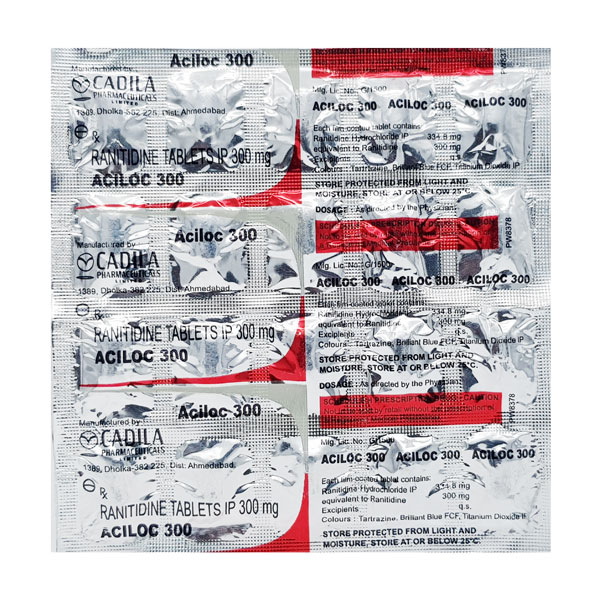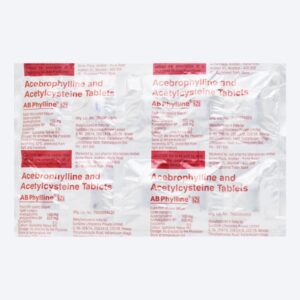1. Product Introduction:
- ACILOC 300MG TABLET is a medication containing the active ingredient ranitidine (300mg). Ranitidine is classified as an H2 blocker, and it works by reducing the production of stomach acid.
ACILOC 300MG TABLET is also commonly prescribed to prevent stomach ulcers and heartburn seen with the use of painkillers. The medicine must be taken in dose and duration as prescribed by the doctor. How much you need, and how often you take it, will depend on what you are being treated for. Follow the advice of your doctor. This medicine should relieve indigestion and heartburn within a few hours and you may only need to take it for a short time when you have symptoms. If you are taking it to prevent ulcers and other conditions you may need to take it for longer. You should keep taking it regularly to prevent problems from happening in the future. You may be able to help improve your symptoms by eating smaller meals more often and avoiding spicy or fatty foods.
Most people who take it do not have any side effects but the most common include headache, constipation, feeling drowsy or tired, and diarrhea. If you do get a side effect, it is usually mild and will go away when you stop taking this medicine or as you adjust to it. Consult your doctor if any of these side effects bother you or do not go away.
Before taking it, you should tell your doctor if you have any kidney or liver problems. This may affect the dose or suitability of this medicine. Also tell your doctor what other medicines you are taking as some may affect, or be affected by, this medicine. This medicine is usually considered safe to take during pregnancy and breastfeeding if it has been prescribed by a doctor. Avoid drinking alcohol as this can increase the amount of acid in your stomach and make your symptoms worse.
2. Benefits:
- Ranitidine (300mg): Used to treat conditions where the stomach produces too much acid, such as gastroesophageal reflux disease (GERD), peptic ulcers, and Zollinger-Ellison syndrome. It helps alleviate symptoms like heartburn, acid indigestion, and stomach discomfort.
3. Side Effects:
- Common side effects may include headache, constipation, diarrhea, and stomach pain.
- Rare but more serious side effects may include an allergic reaction, liver problems, or a low platelet count. If you experience any severe or persistent side effects, seek medical attention.
4. Usage Guidelines:
- Follow the prescribed dosage and administration instructions provided by your healthcare professional.
- Ranitidine is typically taken before meals or at bedtime to reduce stomach acid production during digestion.
- Do not exceed the recommended dosage without consulting your healthcare provider.
5. Drug Interactions:
- Inform your healthcare provider about all the medications you are currently taking, including prescription, over-the-counter, herbal supplements, and vitamins.
- Ranitidine may interact with certain medications, affecting their absorption or efficacy. For example, it may interact with antacids, ketoconazole, atazanavir, and certain drugs that require stomach acid for absorption.
Remember, it is crucial to verify the current status of ranitidine and its formulations in your region and consult with a healthcare professional for personalized advice based on your health condition and medical history. If ranitidine is not recommended or available, your healthcare provider can suggest alternative treatments for your specific needs.
SAFETY ADVICE

Alcohol

Pregnancy

Breast feeding

Driving

Kidney

Liver
| Weight | 0.5 kg |
|---|---|
| Dimensions | 10 × 10 × 10 cm |



